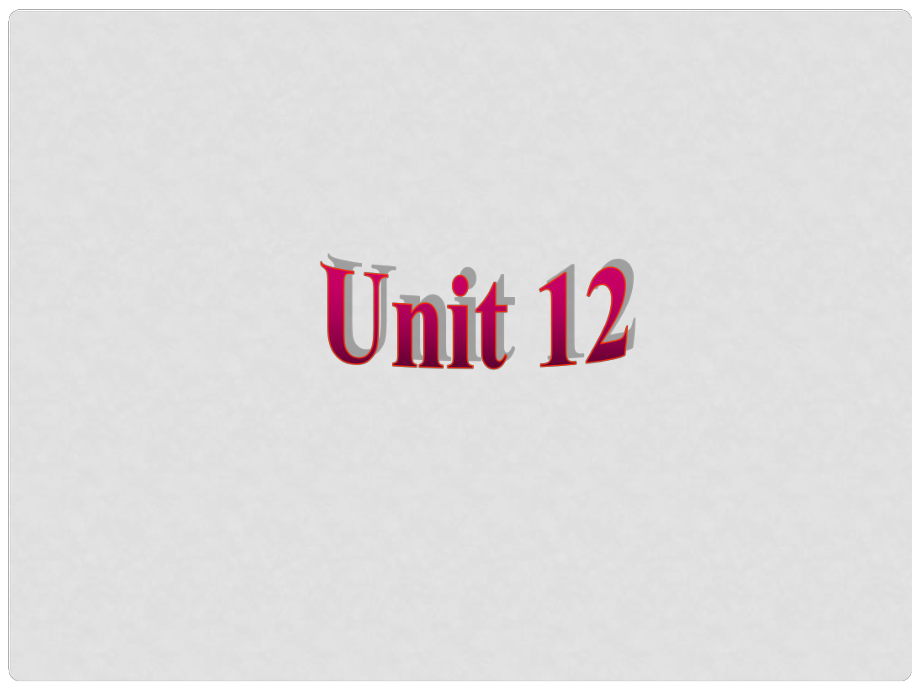《陜西省神木縣大保當初級中學(xué)七年級英語下冊 Unit 12 What did you do last weekend課件4 (新版)人教新目標版》由會員分享��,可在線閱讀�����,更多相關(guān)《陜西省神木縣大保當初級中學(xué)七年級英語下冊 Unit 12 What did you do last weekend課件4 (新版)人教新目標版(30頁珍藏版)》請在裝配圖網(wǎng)上搜索�。
1、 Lisas last weekend was interesting but scary. They went camping in a small village in India. First, they took a long bus ride to a lake in the countryside. There they put up their tents and made a fire to keep them warm and cook food. The first night, they just sat under the moon and told each stor
2��、ies. But Lisa was so tired that she went to sleep early. The next morning, Lisa and her sister got a terrible surprise. When they looked out of the tent, they saw a big snake sleeping near the fire. She was so scared that she couldnt move. They shouted to their parents to let them know about the dan
3���、ger. Her dad started to jump up and down in their tent. This woke the snake up and it moved into the forest near the lake. Her dad told her later that snakes dont have ears but they can feel things moving. He also told her it was important not to go near a snake. This was a very useful lesson for he
4�、r. Look at the pictures and complete the passage.3aI had a busy weekend. On Saturday morning, I cleaned my room. In the afternoon, I _. It was a little difficult. On Saturday night, I stayed at home and _ cook dinner. On Sunday morning, I _. I read a book about history. Then in the afternoon, I _ wi
5����、th my friends. On Sunday night, I _. I saw an interesting talk show. 1. 先看所給的圖畫�����,明確它們所表示的先看所給的圖畫����,明確它們所表示的動作����。動作��。2. 通讀全文�����,理解短文大意�����。通讀全文��,理解短文大意�����。3. 理解每句話的意思,根據(jù)圖片所表示理解每句話的意思����,根據(jù)圖片所表示 的動作及上下文的暗示來確定空格的的動作及上下文的暗示來確定空格的意思。第一個圖表示打掃房間��,在短意思����。第一個圖表示打掃房間,在短文中做了文字描述���。文中做了文字描述�。第二個圖表示在做作業(yè)�����,應(yīng)在第二空第二個圖表示在做作業(yè)����,應(yīng)在第二空格處填;第三個圖顯示格處填
6、�����;第三個圖顯示“媽媽在做媽媽在做飯飯”�����,但本句主語是����,但本句主語是“I”,可推知空���,可推知空格處意為格處意為“幫助媽媽幫助媽媽”����;第四個圖顯���;第四個圖顯示他在圖書館里,可推知第三空格處示他在圖書館里����,可推知第三空格處應(yīng)填應(yīng)填“去了圖書館去了圖書館”;第四、五空格���;第四�、五空格分別為踢足球和看電視����。分別為踢足球和看電視。I had a busy weekend. On Saturday morning, I cleaned my room. In the afternoon, I _. It was a little difficult. On Saturday night, I stayed
7���、at home and _ cook dinner. On Sunday morning, I _. I read a book about history. helped mumdid my homeworkwent to the libraryThen in the afternoon, I _ with my friends. On Sunday night, I _. I saw an interesting talk show. played soccerwatched TV Write about what you did last weekend. 3b1. 這是一篇介紹自己在周
8�、末兩天所這是一篇介紹自己在周末兩天所做的事情���,因此應(yīng)用第一人稱���,做的事情,因此應(yīng)用第一人稱���,用一般過去時態(tài)來寫作��。用一般過去時態(tài)來寫作����。2. 首先,應(yīng)表述自己對周末的總體首先���,應(yīng)表述自己對周末的總體感受����。感受�����。3. 然后���,可以回想一下自己分別在周六然后���,可以回想一下自己分別在周六上午、下午和晚上分別做過什么事情�����;上午���、下午和晚上分別做過什么事情;然后����,再回想���,在周日的上午、下午�、然后,再回想����,在周日的上午、下午�、晚上分別做了什么事情。然后����,將這晚上分別做了什么事情。然后����,將這些事情連在一起,形成一遍連貫的短些事情連在一起�,形成一遍連貫的短文。文���。4. 最后�����,還要再通讀一遍短文����,再重點最后,還要
9�����、再通讀一遍短文�,再重點看一下動詞的一般過去式有沒有搞錯??匆幌聞釉~的一般過去式有沒有搞錯??淳渥邮欠裢槨����?淳渥邮欠裢槨n Saturday morning, I On Sunday morning, I On Saturday afternoon, I On Saturday evening, I On Saturday afternoon, I On Saturday evening, I My last weekend was kind of busy. I washed my clothes on Saturday morning. On Saturday afternoon, I
10����、 went to the library. I read a book there. I cooked dinner in the evening. On Sunday morning, I used the computer. On Sunday afternoon, I played ping-pong. On Sunday evening, I did my homework. 1. _ out with friends 2. _ for a walk3. _ apples4. _ photos gotakeeat go1. Complete the phrases. Then use
11、some of them in the past forms to write a story.5. fly a _6. milk a _7. camp _ the lake8. study _ a test kiteforby cow2. Complete the conversation. A: I had a school trip last week. B: Really. _ (go)?A: I visited the fire station. B: _ (go with)?A: I went with my classmates.B: _ (do)?A: We watched t
12����、he firefighters worked. What an interesting job they have!B: _ (learn anything)?A: Sure. We learned how to call the fire station and what to do when there is a fire. 1. 通讀這段對話,可以看出����,試題要求我通讀這段對話,可以看出��,試題要求我們根據(jù)空格中單詞的提示來完成五個問們根據(jù)空格中單詞的提示來完成五個問句����。句。2. 問句的內(nèi)容除了根據(jù)括號內(nèi)的提示詞之問句的內(nèi)容除了根據(jù)括號內(nèi)的提示詞之外���,還應(yīng)根據(jù)答語的內(nèi)容進行確定�。比外���,還應(yīng)根
13�、據(jù)答語的內(nèi)容進行確定��。比如:由第三句如:由第三句“我參觀了消防站我參觀了消防站”��,可知上文所問為可知上文所問為“Where did you go?”; 由第四句由第四句“我和同學(xué)們一起去的我和同學(xué)們一起去的”����,可�,可知上文問句為知上文問句為“Who did you go with?”; 由最后一句答語由最后一句答語“當然了�,我們學(xué)到當然了,我們學(xué)到了了”�,可知上文應(yīng)是一般疑問句,可知上文應(yīng)是一般疑問句�,“Did you learn anything?”。A: I had a school trip last week. B: Really. _ (go)?A: I visited the fi
14�����、re station. B: _ (go with)?A: I went with my classmates.B: _ (do)?Where did you goWho did you go withWhat did you doA: We watched the firefighters worked. What an interesting job they have!B: _ (learn anything)?A: Sure. We learned how to call the fire station and what to do when there is a fire. Did you learn anything2. 假如上個周末�,你們學(xué)校組織了一假如上個周末,你們學(xué)校組織了一次學(xué)校旅行活動��。請寫一則小作文次學(xué)校旅行活動����。請寫一則小作文來記敘你的學(xué)校旅行的情況。來記敘你的學(xué)校旅行的情況���。 1. 總結(jié)已經(jīng)學(xué)習(xí)過的一些文體活動總結(jié)已經(jīng)學(xué)習(xí)過的一些文體活動類的詞組���,看誰總結(jié)的最多��。類的詞組���,看誰總結(jié)的最多。
 陜西省神木縣大保當初級中學(xué)七年級英語下冊 Unit 12 What did you do last weekend課件4 (新版)人教新目標版
陜西省神木縣大保當初級中學(xué)七年級英語下冊 Unit 12 What did you do last weekend課件4 (新版)人教新目標版

